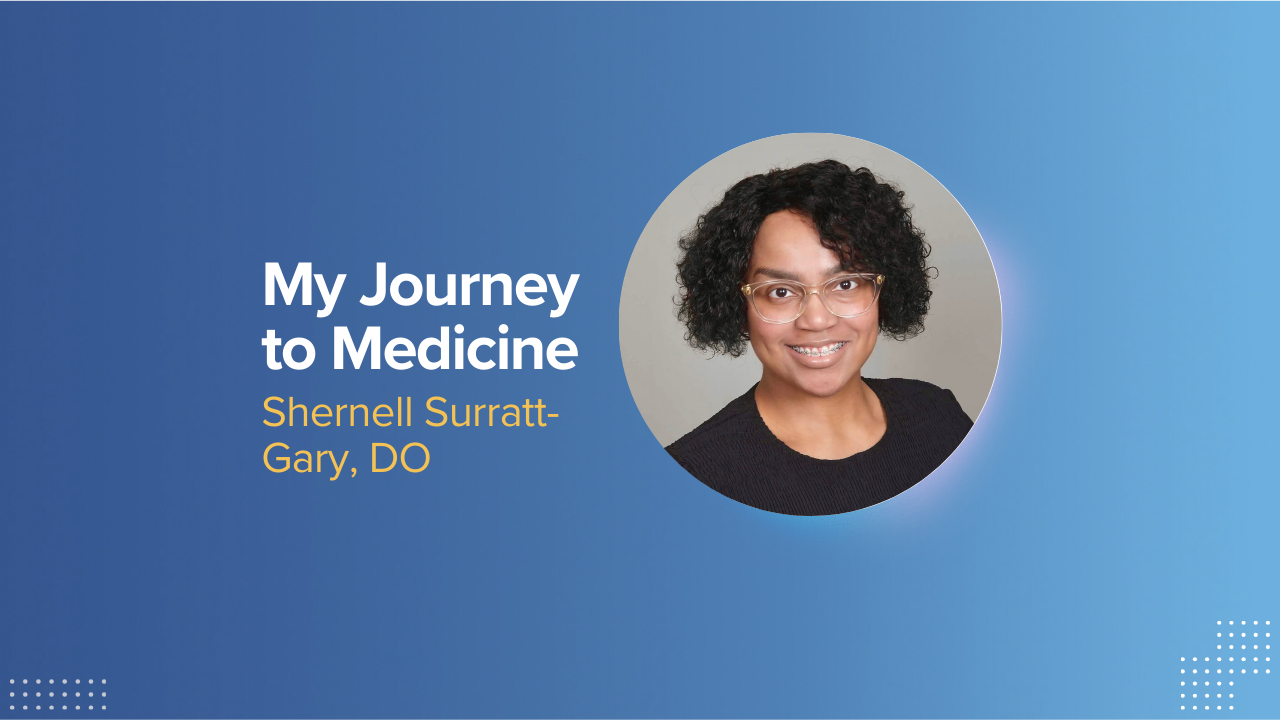I am Dr. Shernell Surratt-Gary, and I want to share my journey with you. I have experienced some disappointments along the way, but I have also experienced some triumphs. Let me start at the very beginning.
When Did I Know I Wanted To Be a Doctor?
During my fifth birthday party, one of my gifts was Lego blocks. I was so happy to get them, and my older cousin was playing blocks with me when she asked me what I wanted to be when I grew up. I said, “I want to be a doctor.” She seemed amazed that I already knew what profession I wanted to pursue. I am even surprised that I can go back to such a distant memory and recall the origin of my decision. With every passing year and grade, my decision never wavered based on what I had said to my cousin at my birthday party.
I grew up in a loving, two-parent household in Tulsa, Oklahoma. My dad, Otis Sr., and mom, Cheryl, married in 1981 after attending Oklahoma State University (OSU) and have remained married to one another for 43 years. My parents taught me the values of compassion, dedication, education, and hard work, ultimately allowing me to choose my profession.
In first grade, I struggled to read at first, but I practiced daily and became one of the best readers in my class. I developed a passion and love for reading books and was often assigned to read more advanced books. In elementary school, I won the school spelling bee in fourth grade and again in fifth grade.
Academics came easy for me. I maintained a 4.0 GPA throughout elementary, middle, and high school. I received acceptance letters from Northeastern State University and the University of Tulsa (TU) during my senior year of high school. I decided to attend the TU to major in biological sciences in the pre-med track.
While at TU, I also enjoyed researching and working on projects during the academic year and summer. I placed third in one poster presentation competition and published an abstract in the Journal of Allergy and Clinical Immunology. I traveled to Texas to present my research at the American Academy of Allergy, Asthma, and Immunology’s 61st annual meeting.
Sign up to get expert tips and exclusive invites to free MCAT classes and medical school admissions workshops!
My First Medical School Admissions Cycle
After graduating with my undergraduate degree, I was not accepted into medical school. However, I did not let that stop me from pursuing my goal. I worked as a lab technician in the histology-pathology lab for three years. While working, I also went to school in the evenings and earned a degree in surgical technology. I then began working with cardiologists and cardiovascular-cardiothoracic surgeons.
I worked for a central hospital system, devoting a total of 5.5 years of service to the company before entering a post-baccalaureate program at Oklahoma State University (OSU) Center for Health Sciences. I was excited to join this academic program because it allowed students from disadvantaged backgrounds or those seeking a second career to build a strong foundation in biomedical sciences while providing a pathway to matriculate into medical school upon successful completion.
Fortunately, I completed the program and officially matriculated into medical school. After years of working toward this goal, I finally made it! Little did I know that my time in medical school would be one of the toughest challenges and experiences I would have to endure.
Navigating Medical School
Unfortunately, medical school vastly amplified my autoimmune disorder, systemic lupus erythematosus (SLE), myalgic encephalomyelitis, and mental health. These chronic conditions caused me to struggle through medical school, with board exam standardized testing, and would also cause a derailment of my dream.
During my third year of medical school, my Papa died. It was truly devastating for me because I was very close to him. He was very supportive of me becoming a doctor. He suffered from heart failure and would not live long. I was exhausted the evening I planned to visit him and drove home. Overnight, I received the dreaded phone call that he had transitioned. I cried and cried. I missed seeing him and hugging him one last time. I felt hurt and regret, which manifested into a deep depression.
With everything that occurred, I should have taken time off. However, I pushed through each clinical rotation and continued studying for board examinations. With the culmination of my chronic conditions, mental health, and the death of my dear Papa, I underperformed on COMLEX Level 2 CE of my board examinations, resulting in passing with multiple attempts.
Sadly, with the culmination of my chronic conditions, mental health, and the death of my dear Papa, I underperformed on COMLEX Level 2 CE of my board examinations. Failing proved to cause severe emotional pain for me. Although I finally passed my board examinations, passing with multiple attempts proved to be my scarlet letter, so to speak, causing residency programs to proceed with caution. Unfortunately, I did not match into a residency program.
Turning “Failure” Into Success
Despite the disappointment of not matching into a residency position, my journey led me to Rosh Review, becoming a Family Medicine content author. Ironically (and happily), I create board review questions to help residents successfully pass their high-stakes board examinations on the first attempt. Even though I do not practice medicine, I help other physicians reach and realize their goals through my board review content creation and writing.
After enduring many challenges and sometimes less-than-favorable circumstances, I completed the requisites to earn my degree in osteopathic medicine, and I am proud of that accomplishment! Do I plan to pursue residency at some point? That certainly is a strong possibility in the future. In the meantime, I have a wonderful and supportive husband and two beautiful children despite enduring almost seven years of infertility; that is a different story for another time.
Advice for Premeds and Medical Students
My advice to medical students is to follow their dreams and passions. Sometimes, the most valuable lessons are learned through obstacles. Failing does not equate to failure but allows individuals to grow and reinvent themselves. The challenges I faced taught me to be resilient. I genuinely hope sharing my journey to becoming a physician can encourage and motivate others to follow their calling by serving others first and foremost, wherever their passion may take them.
Shernell Surratt-Gary, DO, is an Osteopathic Medical Graduate of Oklahoma State University Center for Health Sciences in Tulsa, Oklahoma & a Content Author in Family Medicine at Rosh Review/Blueprint.
Everyone’s journey in medicine looks different, but they all start with the MCAT and applying to medical school. Blueprint MCAT can help you at every stage of your journey with free MCAT resources, MCAT courses, and medical school admissions consulting.




